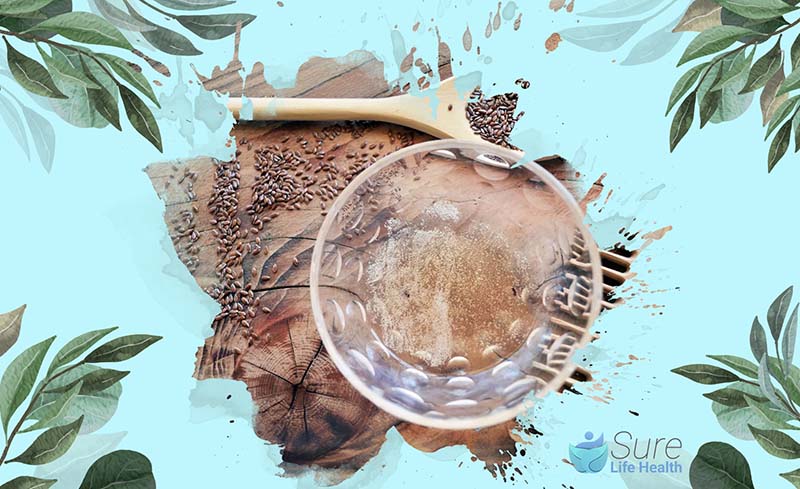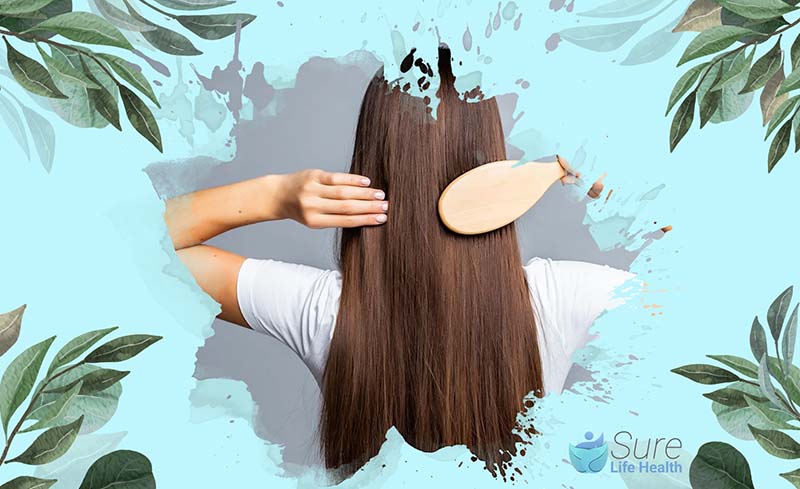Flaxseed, known for its rich nutritional profile, is now a popular natural remedy, especially when considering flax seeds benefits for hair.
This tiny seed is a powerhouse of omega-3 fatty acids, B vitamins, vitamin E, and protein—all crucial nutrients for nourishing both scalp and hair. If you’re aiming for thicker, shinier, and overall healthier hair, flaxseed could be your go-to solution.
In this article, we’ll explore the contents of flaxseed and discuss various ways you can harness flax seeds benefits for hair. Get ready to learn all about the remarkable advantages of incorporating flaxseed into your hair care regimen.
Does Flaxseed Cause Hair Loss?
Flaxseeds are packed with nutrients that are great for hair health. They’re loaded with B vitamins which help in hair growth and strengthen your hair, making it grow faster and stronger. Flaxseeds also contain omega-3 fatty acids. While these aren’t the same as the omega-3s found in fatty fish, they still support heart health and reduce inflammation, making them an excellent option for vegetarians.
When you use flaxseed oil on your hair or eat it, it works much like other plant-based oils. It helps seal your hair cuticles, which prevents frizz and reduces breakage. Plus, the vitamin E in flaxseeds fights off free radicals on your scalp, which helps keep your scalp’s natural oils balanced and keeps your scalp healthy.

10 Benefits of Flax Seeds for Hair Growth
Flax seeds are an excellent addition to your hair care routine, boasting numerous benefits that foster hair growth and enhance hair health. Below are some prominent advantages:
Improves Hair Quality
Flax seeds are loaded with omega-3 fatty acids and vitamin E, key nutrients that strengthen hair and prevent breakage.
They also calm scalp inflammation, which is crucial for promoting healthy hair growth. Combining flaxseed with black seed oil can enhance these effects, providing a synergistic boost for even better results.
Nourishes All Hair Types
Rich in vitamin E and omega-3s, flax seeds deliver deep nourishment to hair. Regular use of flaxseed oil can transform your hair, making it smoother and healthier.
Incorporating flax seeds into your hair care regimen is one of the most effective strategies for maintaining vibrant, strong hair.

Hydrates Curly Hair
Rich in essential fatty acids and nutrients, flaxseed deeply penetrates hair fibers, providing intense nourishment.
Incorporating flaxseed into your hair conditioners, growth oils, and anti-hair fall shampoos not only enhances hair beauty but also improves its overall health.
Prevents Dandruff
Flax seeds are beneficial for scalp health as they nourish and protect it while inhibiting the growth of dandruff-causing microbes.
Regular use of flaxseed in your hair care products ensures a shiny, healthy mane and a clean, dandruff-free scalp.
Revitalizes Dry and Damaged Hair
Rich in Vitamin E, flax seeds excel at rejuvenating dry and damaged hair. This vital nutrient aids in combating hair breakage by fighting off free radicals and diminishing scalp inflammation.
Regular application of flaxseed oil can enhance your hair’s shine and improve its elasticity, making it look healthy and vibrant.

Reduces Hair Loss
Flax seeds are an exceptional source of essential fatty acids and vitamins that play a significant role in hair health.
Incorporating flax seeds into your hair care regimen helps to fortify the hair strands, noticeably reducing hair loss.
Prevents Split Ends
Flax seeds help fortify your hair fibers, significantly reducing breakage. They effectively prevent split ends, maintaining the integrity and health of your hair strands.
Encourages Hair Growth
Incorporating flax seeds into your hair care routine enriches your scalp with essential nutrients necessary for robust hair growth. Consistent use alleviates scalp issues and ensures it remains well-hydrated.

Calms Irritated Scalp
Flax seeds are abundant in omega-3 fatty acids, which play a crucial role in reducing inflammation and sensitivity on the scalp. These seeds work to harmonize the pH levels and oil production on the scalp, soothing the sebaceous glands.
This regulation helps maintain an optimal sebum level, fostering an environment conducive to healthy hair growth. It’s interesting to note that sesame oil also offers similar benefits for hair health.
Shields Your Hair
Incorporating flax seeds into your hair care routine can shield your strands from environmental damage.
These seeds enrich the hair, fortifying it against daily stressors, which results in stronger and more resilient hair.
How to Use Flaxseed for Effective Hair Growth
Flaxseed has many benefits for hair health but must be used properly to maximize its effects. Rather than applying whole or crushed seeds directly, opt for flaxseed oil, which you can find in both the cooking oil aisle of your local grocery and specialty wellness shops.
For a nourishing hair mask, apply a small amount of flaxseed oil to your hair. Gently massage it in, let it sit for about 15 minutes, then rinse and follow with your regular shampoo routine.
Flaxseed oil can also be used as a pre-conditioning rinse. After shampooing, apply the oil and rinse it out before applying your usual conditioner.
Alternatively, create a flaxseed hair gel. This gel is meant to be left in your hair until your next wash, providing ongoing protection and nourishment.
Flaxseed oil is also available in capsule form as a dietary supplement. However, always consult your healthcare provider before starting any supplement regimen, as they can sometimes cause adverse effects.
The recommended dosage of flaxseed oil capsules varies by brand, with some suggesting up to six capsules daily.
Additionally, incorporating crushed flaxseed into your diet can enhance hair health. Sprinkle it over oatmeal, salads, or grains for a nutty flavor and a boost in fatty acids and antioxidants.
Remember, while flaxseed is potent, it achieves the best results when included as part of a well-rounded diet.

Does Using Flaxseed Oil Cause Side Effects?
Flaxseed oil, derived from the seeds of the flax plant, offers a plant-based source of omega-3 fatty acids, primarily alpha-linolenic acid (ALA). Despite its health benefits, flaxseed oil is not without its challenges:
- Gastrointestinal Issues: It can cause abdominal cramps, bloating, gas, diarrhea, and constipation.
- Risk of Toxicity: Consumption of unground or unripe seeds may lead to toxicity.
- Blood Pressure Reduction: Flaxseed oil has the potential to lower blood pressure, which could be problematic for some individuals.
- Cancer Risk: There is a potential increased risk of prostate cancer associated with flaxseed.
- Hormonal Effects: Flaxseed can elevate estrogen levels, which might harm fetal development during pregnancy.
- Drug Interactions: It can interact with medications such as blood thinners, cholesterol drugs, and diabetes treatments.
- Skin Sensitivity: Topical use may cause allergic reactions or sensitivity.
Flaxseed oil isn’t the richest source of omega-3s since the body must convert ALA into the more active forms DHA and EPA, a process that is often inefficient. This means that the actual intake of omega-3s from flaxseed oil is lower than it might appear.
For those seeking to boost their omega-3 levels, fatty fish or fish oil supplements might be a more effective option. Relying solely on flaxseed oil might not provide sufficient omega-3 fatty acids.
Can I Use Flaxseed Oil on My Hair Every Day?
Flaxseed oil is a fantastic choice for daily hair care, adaptable to various hair types. Its richness in omega-3 fatty acids supports hair hydration, strength, and shine.
Regular application can yield optimal results, particularly for those with dry or brittle hair. However, as with any product, monitor your hair’s response and adjust usage accordingly.
How to Make Flaxseed Oil for Hair Growth?
Creating your own flaxseed oil at home is a straightforward process and can be a cost-effective alternative to store-bought options. Start by boiling two cups of water in a pan.
Once the water is boiling, add 2 tablespoons of whole flaxseeds and reduce the heat to a simmer. Let the mixture boil gently for about 8-10 minutes until the liquid starts to thicken. After removing from heat, allow it to cool for 20-30 minutes.
You can then pour the oil into a jar, leaving the seeds in to soften, or strain them out if preferred. Store your homemade flaxseed oil in the refrigerator; it will remain effective for up to 10 days.
Conclusion
In conclusion, flaxseed provides a multitude of benefits for hair care. Its rich composition of vitamins and nutrients makes it a powerful tool for strengthening hair roots, reducing hair loss, and enhancing hair health.
Whether you’re adding flaxseed to your diet, applying flaxseed oil directly to your hair, or incorporating homemade flaxseed gel into your routine, the flax seeds benefits for hair are evident. Integrating flaxseed into your hair care regimen can significantly improve your hair’s strength, growth, and overall appearance.
Don’t miss the opportunity to explore further insightful content from SurelifeHealth.
Professor Gaye Cunnane, PhD, MB, FRCPI
As the Director of Health and Wellbeing at RCPI, Professor Gaye Cunnane is at the helm of initiatives aimed at enhancing the health and well-being of RCPI Trainers and Trainees. Her role extends beyond administration; she is also a respected clinical professor of rheumatology and a consultant rheumatologist at Trinity College Dublin (TCD) and St James’s Hospital. Prof. Cunnane’s medical journey began at TCD, where she graduated from medical school, and her path has been marked by both clinical and academic excellence.
After completing her basic clinical training in medicine, she embarked on PhD studies at University College Dublin and St Vincent’s University Hospital. Her research during this period was focused on prognostic markers in early inflammatory arthritis, a project that saw her collaborating with esteemed universities across Europe, including in Switzerland, The Netherlands, the UK, and Sweden.
Prof. Cunnane’s career took her to the University of California, San Francisco, where she spent three years delving into research on new treatments for lupus. Her academic prowess led her to the University of Leeds in 2001 as a senior lecturer, before returning to Ireland in 2003 to assume her current roles. She has also served as the National Specialty Director for Rheumatology training in Ireland, Programme Director for Basic Specialist Training with RCPI, and as a past President of the Irish Society for Rheumatology.
PUBLISHED ARTICLES
“Rheumatic disease differentiation using immunoglobulin G sugar printing by high-density electrophoresis”: Published in The Journal of Rheumatology, this study reflects her in-depth investigation into rheumatic diseases.
“Benefits of exercise in patients with rheumatoid arthritis: a randomized controlled trial”: This research work, highlighting the positive impact of exercise on rheumatoid arthritis, underscores Prof. Cunnane’s dedication to practical, patient-centered research.
Additionally, Prof. Cunnane has made notable contributions to the Annals of the Rheumatic Diseases, discussing early referral, diagnosis, and treatment of rheumatoid arthritis. She has also been involved in a study on the NCBI platform investigating exercise benefits in rheumatoid arthritis patients.
Professor Gaye Cunnane’s career is a testament to her commitment to improving patient outcomes in rheumatology through rigorous research, clinical excellence, and dedicated teaching. Her work continues to influence the field of rheumatology, both in Ireland and internationally.

